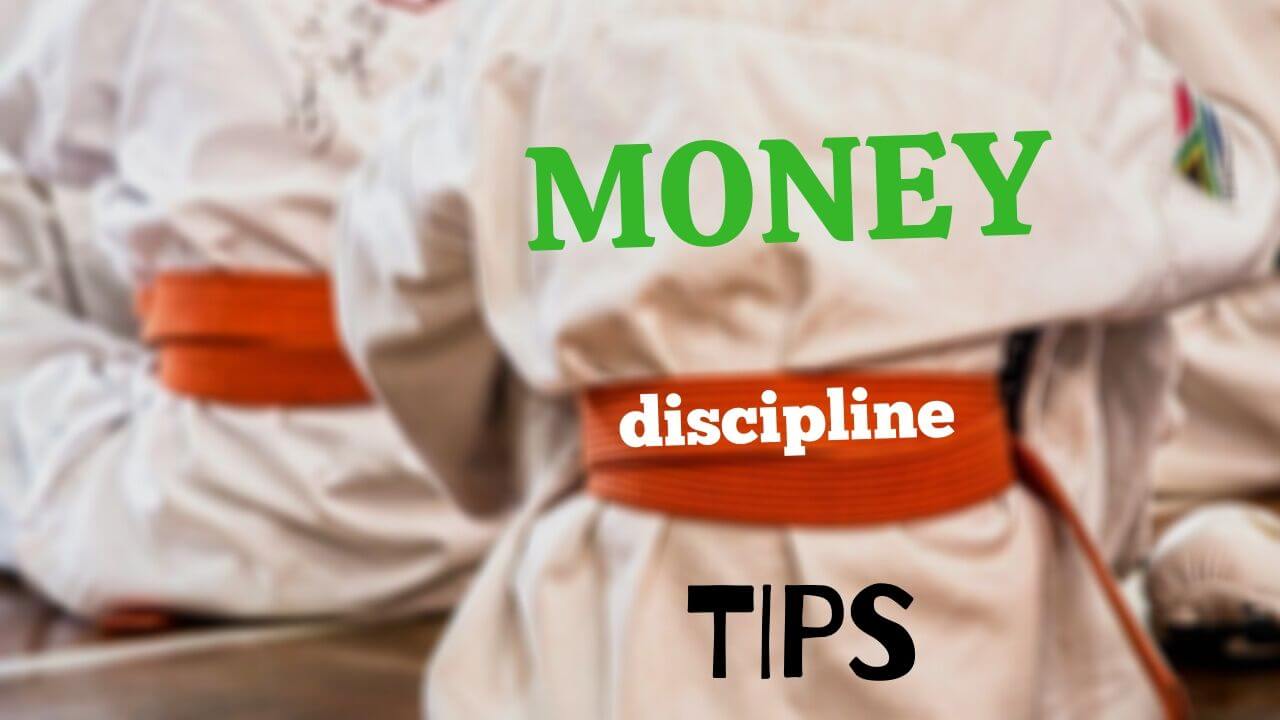
In a world, with Amazon 1-Click Ordering and credit cards that come in all shades of the rainbow, “some” of us may struggle to keep our unruly checkbook in order.
For some, parents and trusted family members helped shape your successful financial future by giving good advice on the importance of saving, investing, and responsible spending.
But for the rest of us bums, we had to learn the hard way by taking a long class in the school of hard knocks only to end up with a low credit score, next to no money in the bank and becoming oblivious on how to properly invest in the market.

But, they say that it’s never too late (for most things at least), and if you are (were) like me and have (had) no idea on how to get your financial life on track, I have created a list of 17 money discipline tips to give your finances a boost.
These are all practical steps that you can take and are in no particular order.
You can take all of these steps to the heart or pick and choose the ones that most resonate with you.
Either way, make sure to take all of these tips to heart and apply them to the best of your ability.
1. Literally, Set Some Goals For Yourself
Sometimes writing down your goals can feel unnecessary but it is essential to write down exactly what you would like to accomplish financially.
Now this could be your short term goals, your long term goals, or both preferably.
This will help guide you through your uncharted financial waters and give you a target to obtain.
You may have tried to set goals in the past and never followed through and that’s ok, it happens.
This time around, try to set simple, obtainable goals using a few words to describe it such as:
- Pay Off House
- Pay Off Car
- Increase Savings
Once you got down what you want to accomplish narrow it down:
Pay Off House
- In 10 years
- Put more money on the principle
- Try to add an extra payment at minimum each year
- Refinance into a lower interest rate if it is beneficial
Pay Off Car
- Refinance loan
- Add more money to the principle
Increase Savings
- Instead of saving 5% of my income, save 10%
- Set up up automatic withdrawals
- Sign up for a high yield savings account
You will eventually improve and expand upon your goals over time, but the most important part is to get started!
2. Make An Action Plan
Now that you have created some goals, it’s time to put an action plan together. Ask yourself “How am I going to achieve these goals?”.
Here are some suggestions:
- You can physically write out your goals and keep them in front of you in common places of your house to remind you of their importance.
- If budgeting is a goal, you can download a spreadsheet or use a program to create a budget and to manage your money
- Create deadlines for your goal both short and long term
- Ask a trusted family member or friend to check in on you and keep you accountable
3. Intention, Intention, Intention
Some of the biggest names in the finance world have a good grasp of intention when it comes to their money.
Two names that come to mind are Dave Ramsey and Kevin O’Leary. I love what they have to say about Intention:
Dave Ramsey: “A budget is people telling their money where to go instead of wondering where it went.”
Kevin O’Leary: “Here’s how I think of my money, as soldiers, I send them out to war every day. I want them to take prisoners and come home, so there’s more of them.”
To Dave and Kevin, every dollar has a purpose and every dollar must be told what to do to reach their intended goal.
What is your intention for your money?
4. Start Paying Yourself
If you have bills, you must pay them. You already know the consequences if you don’t.
Similarly, you should start to pay yourself as well. Stashing away money for a rainy day fund or an emergency fund could be detrimental to staying afloat (hello COVID-19).
Even if you have a 6 to a 12-month emergency fund set up, paying yourself via a retirement account could greatly enrich your life.
5. Start Challenging Yourself
This is one definition of the word Challenge is:
“A test of one’s abilities or resources in a demanding but stimulating undertaking: a career that offers a challenge.” – The Free Dictionary
If it’s too easy, then it’s not a challenge.
Start striving for bigger goals and objectives to conquer and stop playing it safe.
Instead of saying I’m going to pay my mortgage off early, say I’m going to pay off my 30-year mortgage in 10 years or less.
Challenge yourself with something that is going to “test” your abilities and resources.
6. Cut Up or Be Cautious With Credit Cards
A credit card in the hands of an undisciplined person could lead to a disastrous struggle with debt.
Financial experts like Dave Ramsey preach not getting or keeping a credit card for anything. Paying cash or using your debit card should be your only option.
If you do not have any self-control, spend impulsively, and have no self-disciple, then I agree.
But I have a couple of credit cards that I use when I buy items like groceries and items for the home and I pay them off immediately to utilize free travel perks and points.
Overall, credit cards “can” create havoc for your financial life.
If you are struggling with debt you should seriously consider avoiding using credit cards and utilize a cash method of budgeting to get your financial life in order.
7. Start a Budget or Spending Plan
Whether you are creating a budget or a spending plan, you have to know how much money is coming in and how much money is going out.
If you have not already set one up, first you need to:
- calculate your income
- then gather your expenses
- Get organized by using some type of system that you have in place to stay on track
- Set up some type of Tracking Method (budget sheet, Quicken, etc)
You can learn more about these steps by checking out our post entitled “9 Basic Budgeting Tips for Beginners”
8. Automation is Your Friend
With automation, you can “set it and forget it”.
Meaning that you can set up automatic money withdrawals from your checking account to your savings account every time you get paid.
Some employers can even send a portion/percentage of your paycheck “directly” to your savings account.
By taking yourself out of the equation, it gives you more of a chance to get more money into your savings account and not the “shopping cart”.

9. List Out Your Priorities
What are your Needs and Wants? There are several things that we all would like to have, but will your wants get in the way of your goals you set out for yourself?
If so, it is time to once again evaluate your goals and your budget/spending plan.
Make educated choices on the things that you buy and evaluate if these purchases are going to propel your financial life forward.
This doesn’t mean that you can not occasionally get nice things for yourself but if you are on this page looking for money discipline tips, then chances are you would fare better sticking to your budget or spending plan.
10. Know Thy Weakness(es)
You have to make it a point to know where you fall short.
By knowing your weaknesses, you can better avoid situations where you fall into temptation and avoid people who will not encourage you.
11. Sometimes You Just Have to Get Mad at Yourself/Situation
My pastor from my hometown used to always say,
“Until the pain of remaining the same, is greater than the pain of change, you won’t”.
Sometimes you just have to get fired up and be willing to not continue to fool yourself and just cut out all of the excuses.
You can do it, just get to it.
12. Be Wise With Your Spending
Having healthy spending habits is important for becoming financially free.
Being accountable for the money that you spend, and avoiding impulse buying can greatly help you in the long run, especially if you are in debt.
13. Save Your Money
As we hinted at in the “Start Paying Yourself” tip, saving money should be first nature and often.
Saving your money for when things go wrong around the house, the economy goes down the tube (COVID-19), or for any other thing in life that may rear its ugly head, is a smart move for anyone.
A high-interest savings account is a safe place where you can put the money that gives you quick accessibility.
It is safe to hold your money in the long term and unlike investing in the stock market, presents you with no risk.
Now you will not get the returns as if you were to invest in the stock market but you won’t have to worry about the volatility that the stock market brings.
14. Change Lifestyle Habits
Do you need the newest smartphone? Do you need the newest Jordan’s? Do you really need to eat out “every” day?
Sometimes when you are in a financial bind, you may need to analyze your lifestyle habits and decide whether or not they are in line with your financial goals.
15. Change Your Environment if Needed
You can change your environment by leaving notes and words of encouragement around your home, office, and wherever you frequent.
I print out my goals and post them on my wall and sometimes I make my desktop into a list of my goals.
But also, you may have to change the places that you go to and the people that you hang around.
#PeerPressureIsABeast.
This may be necessary to develop healthy habits.
16. Get Some Help/Support
Partner up with family or friends that you trust and that have more experience in money management.
Seek out financial advisors that have a good track record and have, as Dave Ramsey would say, “the heart of a teacher”.
Sometimes it may be wise to seek out someone to guide you through tough times and encourage you to become better.
17. Don’t Go Into Debt
Duh. This is self-explanatory. If you do get this part, then you just don’t get it.




